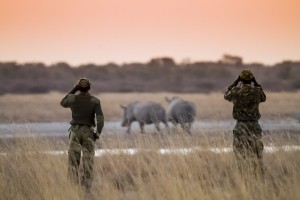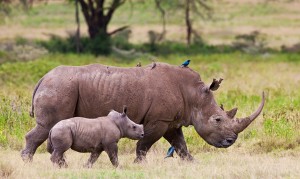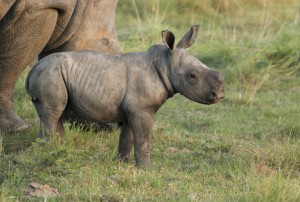 < Pic by Stew Nolan[/caption]On World Ranger Day, the 31st July 2016, the Game Rangers’ Association of Africa (GRAA) salutes the brave African rangers who have dedicated their lives protecting our continent’s greatest assets, its wildlife and wild spaces. In the last 12 months, according to the International Ranger Association (IRF) and GRAA records a known total of 111 rangers worldwide have paid the ultimate sacrifice whilst standing in defence of our natural heritage. 32 of these deaths were recorded in Africa. It must be remembered that these are just the reported deaths and the actual figure is more likely to be substantially higher. World Ranger Day is about honouring the lives of these fallen heroes and highlighting the remarkable contribution being made by rangers in the field of conservation.
“While there have been at least 189 rangers killed in Africa since 2009, many others have been injured whilst on duty,” says Chris Galliers, Chairman of the GRAA. “The work of a ranger in Africa has always been dangerous but what we are seeing now is that the majority of these ranger deaths are as a result of homicide. As the GRAA, we are working hard to reverse this trend by improving the support offered to rangers so that they can carry out their duties effectively and confidently. This is where we need greater investment, if we are to secure the life support systems and wildlife on the continent.”
< Pic by Stew Nolan[/caption]On World Ranger Day, the 31st July 2016, the Game Rangers’ Association of Africa (GRAA) salutes the brave African rangers who have dedicated their lives protecting our continent’s greatest assets, its wildlife and wild spaces. In the last 12 months, according to the International Ranger Association (IRF) and GRAA records a known total of 111 rangers worldwide have paid the ultimate sacrifice whilst standing in defence of our natural heritage. 32 of these deaths were recorded in Africa. It must be remembered that these are just the reported deaths and the actual figure is more likely to be substantially higher. World Ranger Day is about honouring the lives of these fallen heroes and highlighting the remarkable contribution being made by rangers in the field of conservation.
“While there have been at least 189 rangers killed in Africa since 2009, many others have been injured whilst on duty,” says Chris Galliers, Chairman of the GRAA. “The work of a ranger in Africa has always been dangerous but what we are seeing now is that the majority of these ranger deaths are as a result of homicide. As the GRAA, we are working hard to reverse this trend by improving the support offered to rangers so that they can carry out their duties effectively and confidently. This is where we need greater investment, if we are to secure the life support systems and wildlife on the continent.”
 The current plight of Africa’s iconic animal species such as lion, elephant and rhino is well known. Transnational organised crime syndicates in the pursuit of ballooning profits threaten our continent’s biodiversity. They are not the only issues facing Africa’s biodiversity however. Overexploitation of natural resources through bush meat poaching, illegal logging, destruction of habitat and poor management practices alongside the threat from invasive alien species, climate change, nutrient loading and pollution all have dire consequences.
The current plight of Africa’s iconic animal species such as lion, elephant and rhino is well known. Transnational organised crime syndicates in the pursuit of ballooning profits threaten our continent’s biodiversity. They are not the only issues facing Africa’s biodiversity however. Overexploitation of natural resources through bush meat poaching, illegal logging, destruction of habitat and poor management practices alongside the threat from invasive alien species, climate change, nutrient loading and pollution all have dire consequences.
And yet in spite of these challenges, Africa’s rangers remain steadfast in their dedication to make a difference at the very coalface of conservation. Their task is not an easy one and comes at great personal cost.
A recent World Wildlife Fund (WWF) survey entitled ‘Ranger Perceptions: Africa’ involving 570 rangers across 12 countries in Africa highlighted the fact that rangers are putting their lives on the line whilst not always receiving the necessary support. 82% of these rangers said they had faced life threatening situations in their careers to date. 59% believed they are ill equipped to perform their duties, while 42% felt they are inadequately trained for the work they are required to do.
While working long hours in the relentless African bush, rangers not only need to think about their own safety and that of the animals they are protecting, but also the safety of their families at home. According to the WWF’s survey 77% of rangers indicated that they see their family for 10 days or less per month due to their work commitments. 75% of rangers had experienced intimidation and threats because of the work they perform. It is a blight on humanity that nature’s protectors are subject to this abuse.
 It is of utmost importance that Africa’s rangers remain motivated in the field and that their overall well-being is prioritised. This includes servicing their emotional, psychological, environmental, financial, intellectual, occupational, physical, social and spiritual needs. We need to guarantee we create an enabling work environment to ensure rangers can perform their duties which are so critical to all conservation efforts.
It is of utmost importance that Africa’s rangers remain motivated in the field and that their overall well-being is prioritised. This includes servicing their emotional, psychological, environmental, financial, intellectual, occupational, physical, social and spiritual needs. We need to guarantee we create an enabling work environment to ensure rangers can perform their duties which are so critical to all conservation efforts.
On World Ranger Day 2016, the GRAA calls on communities, governments and NGOs to support the honourable and important work of rangers and ensure they receive the necessary training, remuneration, equipment and support they so desperately need.
By supporting Africa’s rangers, you support the species and habitats under their care. We thank our rangers who continue to serve conservation with such vigour, bravery, resilience and dedication and pay tribute to our fallen comrades. We will remember them.